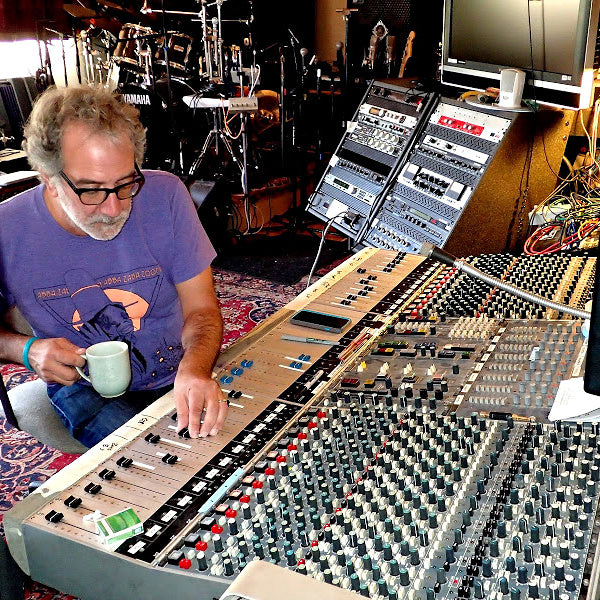Music producer John Agnello. Photo: Gear Club Podcast
Front woman and writer Jackie McLean of indie band Roan Yellowthorn recently sat down with legendary producer John Agnello, who just finished recording and producing Roan Yellowthorn’s latest album, to discuss his fierce love of music.
Agnello (pronounced “an-yellow‘“) is a force to be reckoned with in the music world. The Bensonhurst, Brooklyn resident has worked with the likes of Kurt Vile, Sonic Youth, Dinosaur Jr., Bruce Springsteen, Bob Dylan, Cyndi Lauper, and many other leading artists over the last 25 years. He also hosts the podcast Gear Club with fellow producer and engineer, two-time Grammy winner Stewart Lerman. Gear Club is widely considered by music cognoscenti to be the Car Talk of audio podcasts, breaking down methodology, gear, and experiences with some of the most influential and luminous music-makers in the industry.

Agnello with musician Kurt Vile
John got his start as a teenager working summers putting together equipment and doing deliveries for Eventide, a prominent audio company spearheading digital tech in the 1970s. He was introduced to the company by his brother, Tony Agnello, an early innovator at Eventide who helped invent the world’s first commercially-available digital effects unit, the H910 Harmonizer. (Its signature sound can be heard on many iconic albums of the era.)
Eventide was located in New York City on the first floor of a building on West 54th Street across from Studio 54. On the second floor was the recording studio Sound Exchange. A lover of music from an early age, Agnello would often venture up to the studio to watch the recording and see how records were made.
At the time, he was studying anthropology and sociology at Brooklyn College ($500 per semester in those good old days), but found himself going into Eventide at night just to spend more time there. After two years, he left college without looking back and got an interview at the prominent New York recording studio Record Plant. The studio sought him out and offered him a job. If he had needed a sign that music was his path, there it was.
At this time, recording studios recorded and kept performances on tape, heavy 2 by 12 inch tapes weighing over 10 pounds each. So Agnello needed to be strong as he started out doing general jobs and working as a tape librarian at Record Planet, logging all of the tapes with their project numbers, reel numbers, dates, and contents. These tapes needed to be signed out to be accessed and held the music of artists like Bruce Springsteen, Alice Cooper, Cyndi Lauper, Pink Floyd, and Kiss. The tapes were housed, alphabetized and with cards, in a big storage area built on the roof of West 54th Street building.
After two years working in the tape library, Agnello learned how to assist for recording sessions. After that, he learned how to engineer. By 1981, he was an assistant engineer. By 1984, he was the top engineering assistant at Record Plant, working on records with artists like John Cougar Mellencamp, Aerosmith, and John Waite.
Agnello’s ongoing devotion to recording music shines through in his conversation with McLean:
Jackie McLean: What drew you initially to working in the studio?
John Agnello: I loved music. For me, just being able to spend all day involved in music was something I really wanted to do. The 12-14 hour days in the studio, you were tired, but the energy was always there. The love of it. The process was always special. That’s where I wanted to be. Honestly, I didn’t leave myself with a parachute. The fact that I just walked out of college — I knew that I had to do this for a living. I knew I wasn’t going to say it wasn’t working and go back to school. I didn’t even give myself that option. I told myself that I was going to do this and, no matter what happened, I was going to work hard and learn and be really good at it. Because I had no other choice. It was either that or bust.
JM: You followed your heart.
JA: I followed my passion. Honestly, you have no idea the amount of time I spent as a kid sitting in my basement listening to records in headphones and going to concerts. In the summer, I would go to concerts all the time. I would work during the day and go to concerts at night. There were concerts in Central Park at the ice skating rink and it was general admission, so sometimes we’d wait in line all day just to get good seats. We’d get there at noon and go in at 6:30 just to get in one of the first ten rows.
JM: One thing I really appreciate about you is that, for as long as you’ve been working in music, it’s clear that you still have that fierce passion for it.
JA: Yes, the love is still there. With your record, for instance, it’s been a week and a half since we finished recording and I still get excited to listen to it. I still get chills listening to it. But I do love doing what I do and then I spread the love to my wife, Sharon, and our friends because I’m so proud of the process and of the result.
Your record was interesting because Sharon said to me the other day,
‘I remember hearing the demos — they were just Jackie and the piano, right?’ and I was like, ‘Yeah, it was really just a skeleton of what the songs are about.’ And look at this thing we made! It’s like giving birth to a beautiful child, but after only 16 days.
JM: It must be an amazing experience to do that over and over again.
JA: It’s always great. No matter what I’m working on, they’re all things I’m super proud of and happy to listen to.
I’m constantly trying to do things better. Try new things. I’m never just set in my ways. Don’t get me wrong, I do certain things the same for a long time — like I have a mic I like to use on the snare drum or a great tube mic that I use on the vocals — but I still try new things. And we fall into this stuff once every ten times where it’s like ‘oh wow! Nothing sounds like that. Let’s use that.’
There’s a thing, for instance, on a lot of your songs where the louder you pushed, the louder the effect was. It’s interesting because it changes with your vocal, and that’s one of those things I just happened on.
JM: How did you figure that out?
JA: I like messing around with guitar pedals because they’re analog. Instead of just slapping a plug-in on a vocal, I like having fun with stuff and trying things for different songs. Sometimes that happens — you catch magic.
That’s the thing that keeps me going. I love experimenting with things that are new to me and having the magic happen.

McLean and Agnello (left to right)


Leave a comment